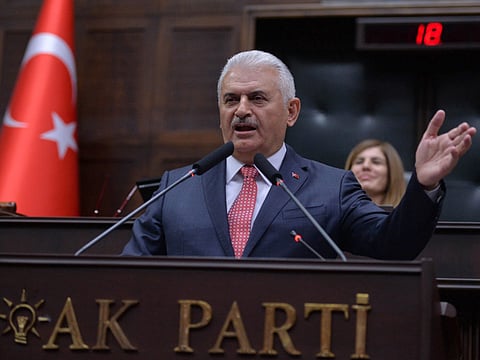Turkey may soften stance on Al Assad exit as Kurdish gains force shift
Ankara and Damascus are on the same page when it comes to Kurdish autonomy, says official from ruling party

Ankara: Turkey’s determination to prevent an autonomous Kurdish region emerging in northern Syria could see it ease up on demands for President Bashar Al Assad’s immediate exit, as it overhauls a foreign policy that has left it more isolated than influential.
Days after taking office last month, new Prime Minister Binali Yildirim — a close ally of President Recep Tayyip Erdogan — said Turkey needed to “increase its friends and decrease its enemies”, in what appeared a tacit admission that his predecessor’s policies had left the Nato member sidelined.
Under former Prime Minister Ahmet Davutoglu, Ankara was insistent on Al Assad’s departure as the only way of stabilising Syria, setting it at odds with Al Assad’s ally Russia and distancing it from a US-led coalition more focused on the fight against Daesh.
Erdogan, who wields ultimate power in Turkey including over foreign policy, has been one of Al Assad’s fiercest critics but analysts say changing circumstances on the ground could force a softening of his rhetoric.
Turkey’s worst nightmare in Syria has come true: Russian support has enabled Al Assad to remain in power, while Kurdish militia fighters have benefited from US support as they battle Daesh, bolstering their position in territory adjacent to the Turkish border.
Yildirim’s government has outlined four areas of policy where it wants to take new steps: Israel, Russia, the European Union and Syria, the last motivated in part by a realisation that Al Assad’s demise could benefit the Kurdish militia.
“Al Assad is, at the end of the day, a killer. He is torturing his own people. We’re not going to change our stance on that,” a senior official from the ruling AK Party said, requesting anonymity so as to speak more freely.
“But he does not support Kurdish autonomy. We may not like each other, but on that, we’re backing the same policy,” he said.
Ankara fears that territorial gains by Kurdish YPG fighters in northern Syria will fuel an insurgency by the Kurdistan Workers Party (PKK), which has waged an armed struggle in Turkey’s southeast for three decades.
The groups do not deny links. The PKK founded the YPG as a Syrian organisation a decade ago and both are inspired by Abdullah Ocalan, who led the PKK from its inception and lived in Syria shortly before his capture in 1999. He remains in jail.
Conflict in Turkey’s southeast has flared anew since a ceasefire with the PKK collapsed last July — fuelled in part, according to the Turkish authorities, by weapons and fighters crossing the border from Syria.
That leaves Turkey with few easy options, according to Mehmet Yegin, an analyst at Ankara-based think tank USAK: relaunching peace talks with the PKK, which the government has so far ruled out, or indirectly relying on Al Assad as a buffer.
“The only thing that can change is Turkey can stop insisting that Al Assad must go,” he said.
As Yildirim and his team adjust foreign policy in the wake of Davutoglu’s departure, there are also few signs of significant progress in relations with the European Union, despite Brussels’ reliance on Ankara to maintain its side of a landmark deal on migration.
Turkey’s decade-long accession talks with the EU have largely stalled, with some leaders in Europe increasingly concerned about what they see as a creep towards authoritarianism as Erdogan seeks to broaden his powers.
The migrant deal, criticised by rights groups, has sharply cut the number of refugees and migrants reaching Greece, giving EU leaders breathing space after more than a million arrived last year. But the bloc is treading a difficult line, facing accusations of compromising its values by failing to be critical enough of Turkey’s record on rights and freedoms.
In a sign of tensions, the EU’s top envoy to Ankara quit on Tuesday after displaying what Celik said was disrespect for Turkish values and for Erdogan. The envoy had made critical comments in the Turkish media about Ankara’s implementation of the accord.
Of the new government’s four foreign policy priorities, that leaves only efforts to restore ties with former ally Israel showing any immediate signs of progress.
Foreign Minister Mevlut Cavusoglu said last week Turkey was just one or two meetings away from normalising relations, after diplomatic and military ties were cut in 2010 when Israeli commandos stormed a Turkish ship in an aid flotilla to Gaza, killing 10 Turks.
Turkey wants Israel to end a sea and air blockade of the Gaza Strip but Israel has ruled out ending its embargo of the Palestinian territory.
“There are creative solutions to be found, and I think that both sides have the political will to find a solution,” a Turkish official familiar with the efforts said, adding a deal could be within reach.
“I cannot tell you any timeline, but we are very close.”



